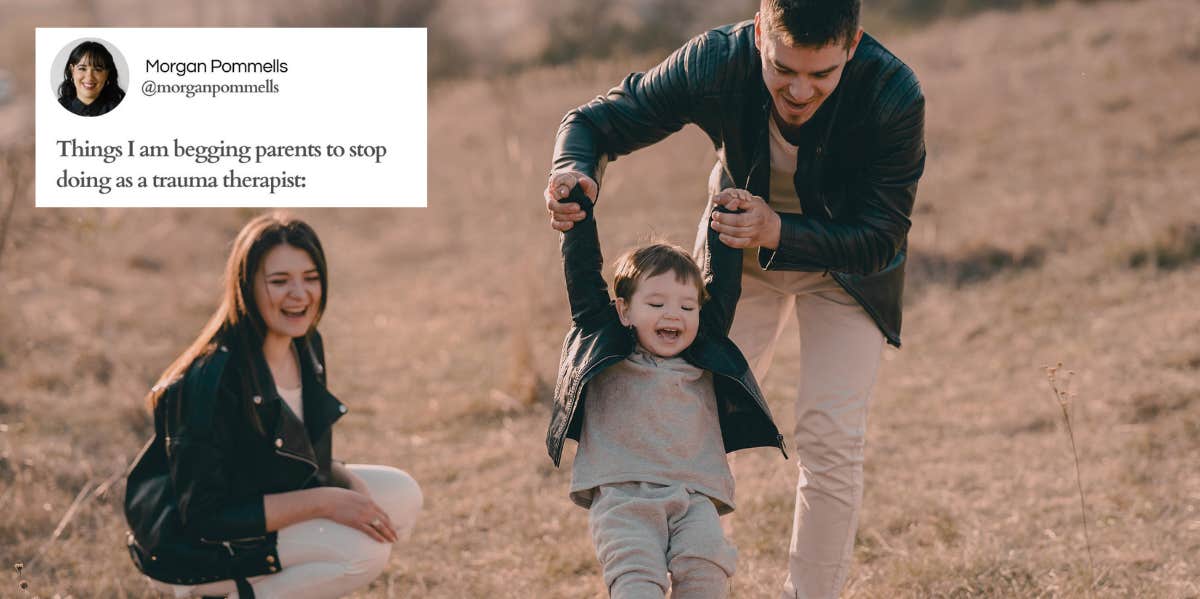12 Things A Childhood Trauma Therapist Is 'Begging Parents To Stop Doing'
It's important for parents to actively work toward healing their own childhood trauma to provide a better life for their kids.
 Gustavo Fring / Pexels, Instagram
Gustavo Fring / Pexels, Instagram A therapist has shared a list of things that parents should stop doing to their children to prevent leaving emotional wounds.
Morgan Pommells, a childhood trauma therapist from Ontario, Canada, shared on her Instagram account helpful tips that parents should be using whilst raising their children.
"Parenting is stressful and no one expects parents to do it perfectly," Pommells pointed out. "Children don’t even need perfect parenting — they just need 'safe parenting.'"
The therapist shared 12 things that parents should stop doing with their children.
In Pommells' post, she shared a list of things that she is "begging" parents to please read and implement into their parenting styles to save their children from having to sift through their childhood trauma once they enter adulthood.
"Yelling at your children as soon as you get home from work," Pommells wrote for the first issue. Both the second and third revolved around the same theme of not using emotional warfare to punish children. "Giving the silent treatment to the entire room and family when you're upset."
Pommells added that parents shouldn't wake their children up using "loud or aggressive noises." In the caption of her post, she expanded on these rules and pointed out that psychologically, yelling at children does nothing but cause harm to their nervous systems.
"All of these things can trigger the body's stress response, which can have us to shoot up into fight or flight and *stay there* if we have to continue to live in fear," she wrote.
Pommells encouraged parents to avoid leaving emotional scars on their children.
For her third, fourth, and fifth list of things parents should avoid, Pommells explained that when parents cause deep emotional trauma to their children, those young people will grow up and oftentimes seek out therapy to try and work through the toxic way their parents treated or spoke to them.
"Treating siblings so differently that there is a clear favorite," she listed as the third point. "Saying, 'I guess I'm just the worst mom then' when your kids share they're hurt. Refusing to apologize because 'you're the parent' and therefore 'don't have to.'"
According to data acquired by the Substance Abuse and Mental Health Services Administration, childhood trauma is fairly common. More than two-thirds of children reported at least one traumatic event by age 16.
Pommells emphasized that if any child experienced this with their parents, they shouldn't feel as if they're alone or unworthy because of it. "I promise you are not alone. I promise you deserved so much better," she insisted.
Pommells pointed out the unrealistic standard of being a 'perfect parent,' but rather being a 'safe parent.'
For Pommells' last several points, she explained that children shouldn't have to be responsible for their parents' feelings. "If you’ve been around long enough, you know that I am forever telling parents to stop working their shit out on their kids," she wrote.
"Expecting the whole household to walk on eggshells when you're in a bad mood. Not protecting your children from the other parent when that parent did something legitimately wrong or harmful. Depending on them for emotional support in the way you would [with] a partner," Pommells stated as the sixth, seventh, and eighth problems.
She remarked that parents need to prioritize their children's safety in all situations, and failing to do so will only result in their children seeking out a childhood therapist once they grow older.
"Treating [your children] unfairly because 'the world isn't fair...' this actually doesn't 'prepare' them for anything. Seeing your children as an 'extension' of you. They are so much more than this. Believing they should be grateful because you feed and house them. This is your job," she concluded, listing off the final three things parents should stop doing.
By parents actively using any of these tactics in their parenting style, it will only cause resentment from their child as well as drastically affect their self-esteem.
"To be clear: I firmly believe that 99.9% of parents are doing the absolute best they can," Pommells clarified. "Most of these mistakes are made at a subconscious level. But that doesn’t mean they are without consequences or that we shouldn’t strive for better."
Being able to break the cycle of childhood trauma will only lead to a healthy transition into adulthood.
Parents play a crucial role in ensuring that their children have a safe and nurturing environment to grow up in, which helps minimize the risk of childhood trauma.
By contrast, when parents create a loving and secure environment, children are more likely to develop positive self-esteem and a strong sense of identity. This foundation can help them navigate social relationships, handle peer pressure, and build a positive self-image.
As Pommells stated, being a parent doesn't come with a guidebook or training classes. It's an on-the-cuff job that lasts for a lifetime, and doesn't stop once your children are 18 and are officially seen as entering the beginning of adulthood.
It's important to note that no parent can completely shield their child from all potential sources of trauma. However, by actively working to break the cycle of their childhood trauma, parents can significantly reduce the risk and mitigate the impact of childhood trauma on their own children's lives.
Nia Tipton is a Chicago-based entertainment, news, and lifestyle writer whose work delves into modern-day issues and experiences.
